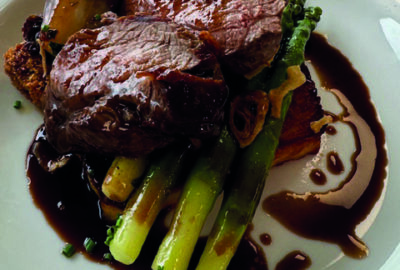Fresh from a busy summer fronting the successful Pub in the Park festivals across the UK, we caught up with the legend that is Tom Kerridge to get his latest take on the industry, hear why the UK needs a Ministry of Hospitality and find out about his latest cookbook – Real Life Recipes.
How’s business?
The situation is fluctuating to be honest and there is not a massive amount of certainty. The restaurants are good but there are definitely some new trends when it comes to busy times. Numbers have probably dropped a little in the city centre venues at lunch with many people still working from home or doing three or four-day weeks. Dinners on the other hand are very busy so it’s almost balanced things out a little bit. I think we’re seeing more people eating out for leisure and pleasure, as opposed to work lunches.
How hard are the rising prices hurting hospitality businesses?
The cost rises coming in are huge and hospitality businesses just can’t swallow them all up. They’re under an incredible amount of pressure already. Most have huge debt burden from the last two years where they have taken on loans to pay staff and keep afloat. Those loan repayments now need to be paid back, add on the rising costs hitting every chef, plus throw in the cost of living crisis that is hitting consumers, which affects their decision making when going out, you can see why it isn’t easy at present. The only way is to increase prices and put those costs on to the guests – it is inevitable. There is no other way.
Is there any way chefs and hospitality owners can counter the rising costs without customers having to pay more?
Things like boxes of butter have risen from around £23 to about £48 a box. Over double just for your butter, a basic staple ingredient. If 30% of your revenue is the cost of food and that then doubles, it just becomes unworkable if you stick at the same prices. Businesses will have to look at where they can put prices and will have to concentrate on providing fantastic value for money. While there are key issues affecting the industry as a whole, they will affect different businesses in different ways. It’s about really knowing your business and finding the solutions required. Unfortunately, there is no single answer or solution – the only thing we can be certain of is that prices will go up.
How have the challenges affected the different businesses?
Across each site for us it is very different. The Coach is now only open 5 days a week due to staffing issues. At The Hand & Flowers we’re reducing the size of the menu slightly. With two Michelin stars it’s always been about quality so to ensure that quality, the menu will be smaller meaning we can use less produce but we can fine tune. There is no getting away from the fact that The Hand & Flowers is expensive but it’s an expensive venue to operate and if people are paying a premium, you have to deliver on quality, service and the experience.
Can the government do more?
Unfortunately, the government always seem a little pre-occupied fighting each other. During the pandemic and after it, there was a campaign led by leading hospitality voices and players – Seat at the Table – to lobby for a Minister of Hospitality. It doesn’t exist and the government doesn’t seem to understand why it is so important. In fact, the response we got was very negative. This is an industry that employs well over 3 million people and with the supply chain it’s even more. In terms of the revenue it generates, the tax it brings in, the social standing, the connecting of people and communities, building future generations – the hospitality sector is vital.
Can you see a way to change the status quo in government and finally get a ministry for hospitality?
The only way I can see it changing is if a political party picks up the baton and runs with it. As an industry we are very happy to talk to anyone but we’re waiting for a political party who understands us, isn’t just looking for a headline and takes us seriously. It’s not just a minister we need, we need a ministry with a connection in fisheries, farming, agriculture, travel and tourism as hospitality bleeds into so many other areas. Just like education, sport, media and health – hospitality is a huge area so it needs its own space. There is a huge difference between a five-star restaurant in London and a country pub in the Lake District or a seasonal hospitality events business. Without a real understanding of the industry within government and amongst the politicians and civil servants, and real clarity about what the sector needs, it doesn’t matter which party is in power, it falls on deaf ears. We won’t be able to implement change until we have some policy makers who really understand and appreciates the hospitality industry and the good it does.
How positive can you feel moving forward?
We can’t moan too much but there is no doubt a big problem around staffing, supply chain issues and rising costs are going to make it challenging in the coming months but that is the same for everyone in hospitality and catering. There will be some people who look at the situation in the market and see opportunity, but for us we won’t be pushing ahead with any new openings. Our focus is on maintaining standards and quality and making sure our current businesses are re-settled and running properly.
Who were your mentors or who did you look up to?
Marco Pierre White and his cookery book was a ground-breaking and seminal moment in cookbooks. Usually they were a bit textbook in style but suddenly this book came out that was exciting and vibrant with beautiful photography. It painted a fantastic picture of the world of hospitality. Marco and Marco’s book have been massively important for many chefs around my age. It made food so cool.
Who’s exciting you in the industry at the moment?
I see myself as part of the older school now at 49 and maybe not as cutting edge as the new generation coming through, who I enjoy following. Look at Gareth Ward, Paul Ainsworth, Nathan Davies and Spencer Metzger to the guys at Cue Point – Mursal Saiq and pit master Josh Moroney with Afghan bbq, they are ripping up the textbook and doing some amazing things. These are incredible cooks, ten-fifteen years younger than me, and are the guys inspiring the next generation of young chefs. That’s what makes the industry so exciting – it keeps rolling, it keeps evolving, growing and developing. Food never sits still.
What trends are exciting you?
I think Asian flavours are definitely in-vogue. Think Korean BBQ, Japanese or south-east Asian – big, bold, punchy flavours that we’re seeing more and more of. The other trend is outdoor cooking, which grew during the pandemic and it has gone beyond barbecue – it’s outdoor cookery. There are so many ways of cooking outdoors whether it’s on a green egg, fire pit, smoker or using different woods. There are so many different methods and techniques that are being experimented with and it’s that extra layer of flavour that the smoke can bring to meat and veg that is definitely being appreciated and is here to stay. The great thing about food fashions and trends is that when something arrives that is really good – it stays, grows and evolves.
Tell us about the new book?
A lot of the work and recipes were developed during the pandemic but when you are at the front end of food you can often see what is coming down the line. You can see the rising costs coming into the supply chain before it hits the supermarket. The book is about dishes that are easy to make, pocket friendly, quick and perfect for the reality of life.
Signature Dish
There is a super Baked Salmon recipe in the book, which I would choose as my Signature Dish. It has a beautiful herb crust made with mustard and panko breadcrumbs. Salmon is one of those fish that has a good shelf life and you can do lots with it. This dish is really tasty, easy to make, quick to get on the table but a real treat.
Click here for Tom’s Baked Salmon recipe!



